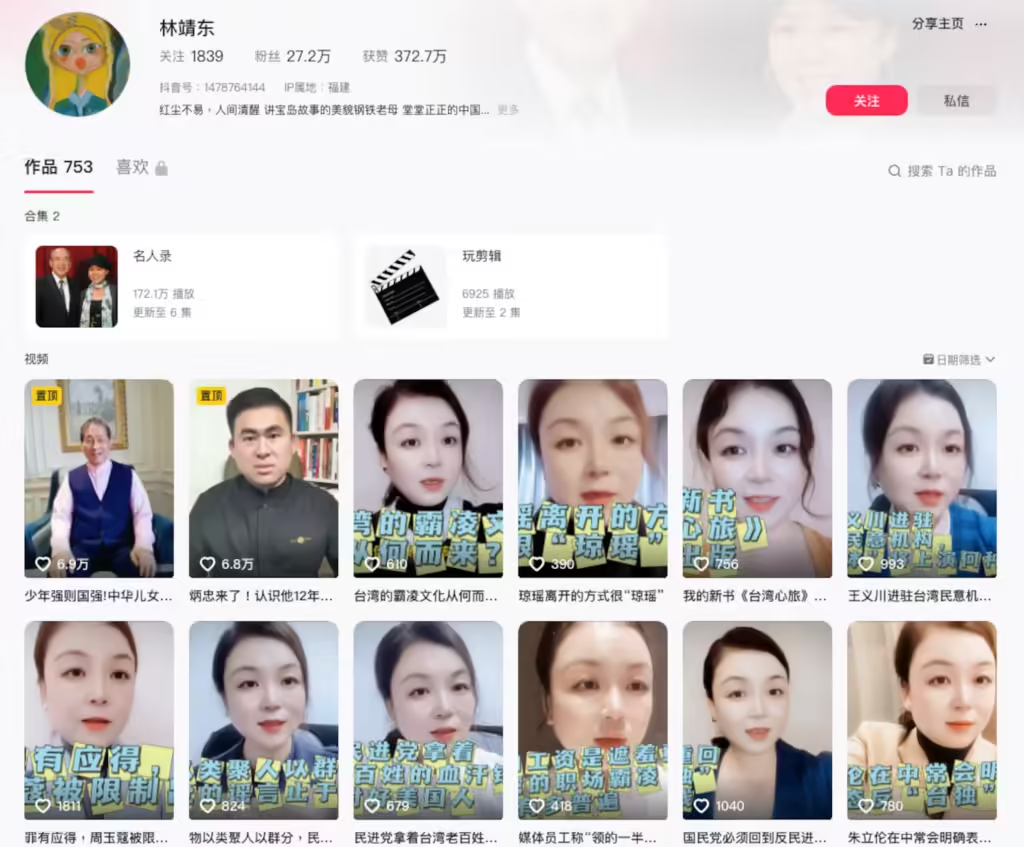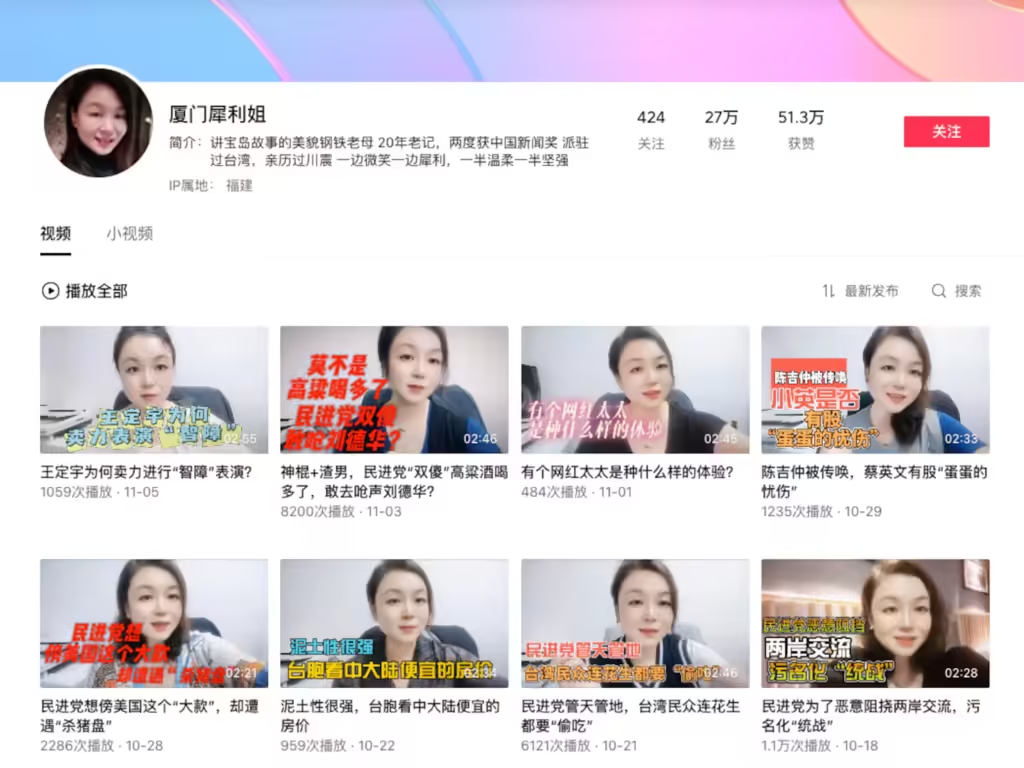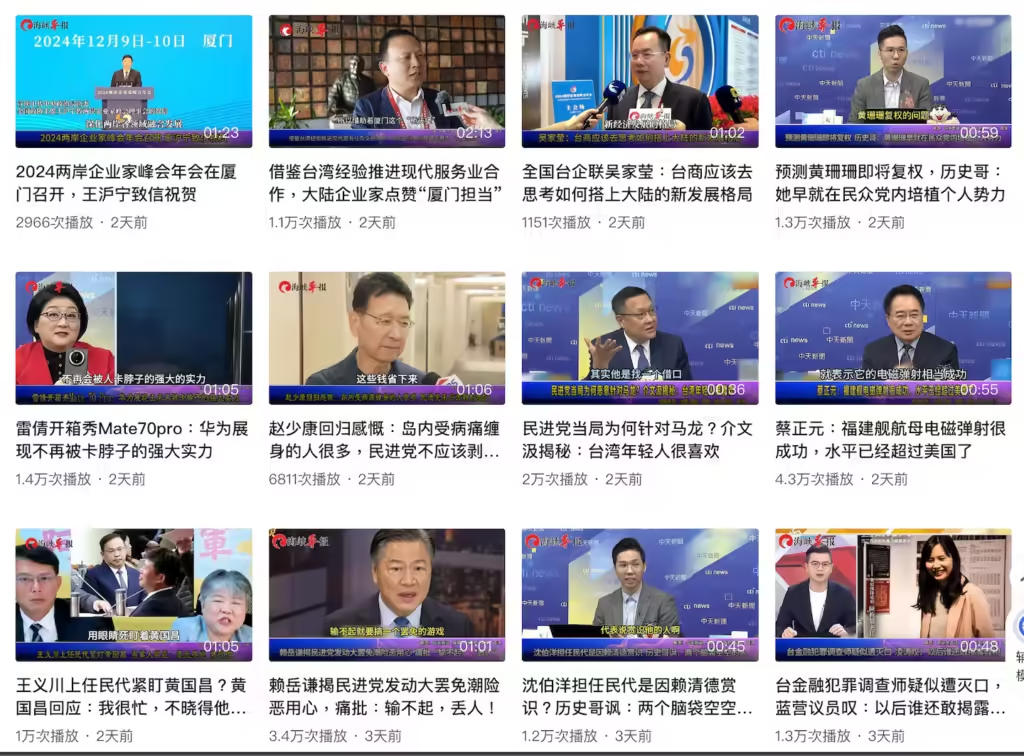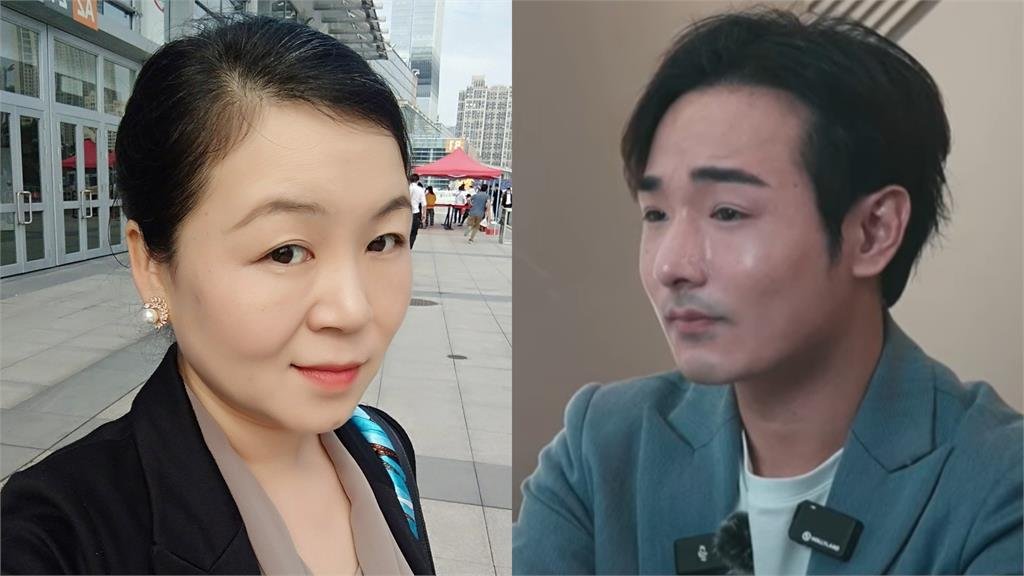Taiwanese YouTuber “Ba Jiong” released a documentary titled “United Front Documentary” on the 6th, which garnered over 2.5 million views within just five days, sparking widespread discussion. The film exposes the roles of Chinese journalist Lin Jingdong and the Straits Herald, as well as the operations of online media reporter Lin Xianyuan. It highlights how the two have long collaborated with certain Taiwanese influencers: Lin Jingdong provides material, while Lin Xianyuan manipulates public opinion through fake polls and propaganda, producing content critical of Taiwan’s Democratic Progressive Party (DPP) government. Together, they form key components of China’s united front operations, constructing a cross-media infiltration network.
The Role of China’s United Front
Lin Jingdong was mentioned in the indictment related to the Zhi Media case, revealing that she is merely one link in a larger united front network. She has used her position in the media to conduct united front operations targeting Taiwan’s journalism industry for over 20 years. In 2019, The Reporter published an investigative article titled “The Unkillable Content Farms—Uncovering the Operators and Chinese Factors Behind ‘Mixin’”, which first shed light on Lin Jingdong’s deep involvement in the united front network.


The report revealed that the operator behind the infamous Taiwanese content farm “Mixin” was Lin Zhengguo, a committee member of the New Party Youth Committee. In 2018, Lin Zhengguo, along with New Party spokesperson Wang Bingzhong, attended the opening ceremony of the Straits Herald Multimedia Center in Xiamen and posed for a photo, in which Lin Jingdong also appeared. The Reporter further noted that during her tenure as a stationed journalist in Taiwan, Lin Jingdong established extensive pro-China networks. These resources continued to support her after transitioning to become a social media influencer, serving as the foundation for her content production.

The Role of Straits Herald in the United Front
The Straits Herald, under the Fujian Daily Media Group controlled by the Chinese Communist Party’s (CCP) Fujian Provincial Committee, has been focused on propaganda targeting Taiwan since its founding in 1991. In 2023, the Straits Herald established the first “Integration Development Youth Entrepreneurship Space” across the Taiwan Strait, aiming to foster exchanges between youth from Taiwan and mainland China. However, it has also been found to frequently recycle political commentary from specific Taiwanese media outlets, embedding erroneous or false information. According to reports from the Asia Fact Check Lab (AFCL), the Straits Herald has been exposed multiple times for disseminating misinformation aimed at sowing distrust of the United States and Japan, as well as other content serving united front purposes.
Moreover, journalists at the Straits Herald often undertake additional tasks beyond news reporting. For instance, Lin Jingdong has repeatedly acted as a liaison for pro-China forces in several public opinion warfare incidents targeting Taiwan. Using the alias “Xiamen Sharp Lady” on social media, she has consistently produced content attacking Taiwan’s ruling DPP and promoting CCP narratives, operating in a united front strategy centered on emotional and ideological influence.

The Operations of Fake Polls and Media Clusters
Lin Xianyuan, identified in the Zhi Media case, is considered a key figure in Taiwan’s small-scale online media clusters. He has created multiple media brands and operates based on personal networks, using local online media to publish fake polls and politically motivated propaganda. During the 2024 Taiwanese presidential election, Lin Xianyuan orchestrated a fake poll that falsely claimed the Kuomintang’s Hou-Ko ticket had overtaken its rivals, propelling it into online prominence. This demonstrates his ability to disrupt public opinion effectively.

Potential Threats from Small-Scale Online Media
An expert familiar with Taiwan’s media ecosystem noted that it is difficult to classify websites like Zhi Media as local media due to their diverse purposes, which include:
- Revenue Generation: These websites may sell advertising space or charge local governments or council members for “promotional fees.” When cooperation is denied, they may resort to unfavorable reporting or fake polls as threats.
- Election-Time Operations: These websites often appear suddenly during elections to disseminate specific narratives and vanish afterward, only to reappear under different names in the next election cycle.
- Political Tools: They are often used to target specific politicians or push politically motivated narratives.
Despite their seemingly limited influence, these small-scale media outlets can achieve significant impact through platforms like LINE and Facebook, which are widely used in Taiwan, making their effects difficult to underestimate.
DSET researcher Lin Yucang stated that these small media outlets are designed to meet China’s propaganda needs, creating “background noise” that gradually influences public perception. He likened their behavior to “discharging wastewater,” where low-cost content pollutes Taiwan’s information landscape.
Li Yizhi, assistant professor of journalism at National Chengchi University, added that such outlets gain credibility by leveraging aggregation platforms like Yahoo News Taiwan or LINE TODAY. Once content appears on these platforms, it is often perceived as trustworthy, becoming a hidden driver of public opinion.
Long-Term Dangers of the United Front and Misinformation
The CCP employs a “small-scale media, large-scale impact” strategy targeting Taiwan’s central and southern regions, lower-income groups, and younger generations. While these media outlets may seem minor, their cumulative “background noise” effect can gradually erode trust within Taiwanese society. For example, during elections, they spread fake polls or exaggerated reports aimed at manipulating voter sentiment.
Additionally, the commercial operations of these media outlets exacerbate the spread of misinformation. By monetizing low-cost content and launching targeted attacks or campaigns during critical periods, they further amplify societal divisions.
Recommendations and Future Challenges
Experts propose the following strategies to counter CCP united front infiltration:
- Expose the Truth: Strengthen public awareness of united front activities and misinformation through media and civic organizations.
- Media Literacy Education: Promote digital literacy to enhance public ability to identify fake news.
- Platform Oversight: Major aggregation platforms like Yahoo and LINE should improve content moderation and filtering mechanisms.
- Legal Improvements: Establish stricter legal frameworks to curb the spread of fake news and united front content.
Lin Jingdong and Lin Xianyuan exemplify two key pillars of the CCP’s united front network. By exploiting weaknesses in Taiwan’s media ecosystem, they have infiltrated public opinion to influence Taiwanese society and politics. Moving forward, strengthening media literacy and building robust defense mechanisms will be crucial for safeguarding Taiwan’s information environment against foreign interference.


